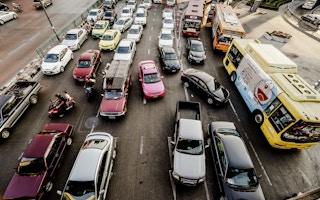Global transport activity will more than double by 2050 and drive a rise in transport emissions too steep for countries’ existing decarbonisation plans to thwart, predicts a new report by the International Transport Forum (ITF), a global transport policy think tank.
Although the Covid-19 crisis has put a damper on economic forecasts, the study expects passenger transport activity to increase 2.3-fold relative to 2015 over the next three decades as the world population proliferates and incomes rise, with freight transport to grow 2.6-fold.
Even if today’s climate commitments are fully met, this projected rise in demand will more than offset expected emissions reductions, leading to an increase of 16 per cent, warns the study.
By contrast, the right interventions could cause emissions to fall nearly 70 per cent between 2015 and mid-century, pivoting mobility onto a sustainable path. Such heavy carbon cuts could bring the Paris Agreement’s goal of limiting heating to 1.5 degrees Celsius within reach, says the ITF.
But this will require more aggressive policies that back low-carbon technologies and reduce countries’ dependence on oil, reinforce positive behavioural changes precipitated by the pandemic, and gear Covid-19 stimulus packages towards decarbonisation, writes the Paris-based intergovernmental organisation.
What needs to happen?
With 68 per cent of the world’s population predicted to live in urban spaces by 2050, cities have a substantial role to play in the transition, the report highlights. Their high densities of people, services and infrastructure also make them the most effective places to manage transport demand.
By shortening travel distances, offering climate-friendly transport options, and incentivising urbanites to use them, cities could slash transport emissions by a staggering 80 per cent, the ITF estimates.
Regional passenger transport could more than halve its total emissions, while emissions from trucks carrying freight could be 72 per cent lower than in 2015. Unlike cities, however, regional transport will rely more heavily on technological improvements to decarbonise. In addition, freight transport will need to consolidate loads and improve and shorten supply chains.
The report gives several recommendations on how nations can steer transport away from its current planet-cooking trajectory.
First, governments need to revive pandemic-hit economies responsibly. The ITF highlights that the recovery from the economic slowdown offers a unique opportunity to spur a shift in mobility behaviour to reduce unnecessary travel and rapidly scale up the use of electric vehicles and low-carbon fuels.
Second, the paper urges countries to set bolder targets in this year’s revision of their emissions reduction pledges under the Paris climate deal, or Nationally Determined Contributions.
These more ambitious goals will then need to be underpinned with concrete efforts to improve energy efficiency and support low-carbon research and development critical to decarbonise hard-to-abate sectors like aviation and long-haul road freight, the report says.
Covid-19: Boon or bane?
Covid-19 lockdowns and fears of contracting and spreading the virus have entailed a significant reduction in passenger transport demand globally, with the Paris-headquartered International Energy Agency (IEA) estimating that the pandemic may have triggered permanent changes in transport behaviour.
Companies, for instance, may continue to replace business trips with videoconferencing where possible even after movement restrictions ease, while urban dwellers may opt to cycle on shorter routes instead of boarding packed trains and buses.
But while research has shown that disruptions can be a catalyst for long-lasting drops in transport demand and shifts towards sustainable travel, the IEA has stressed that decisive policy action will be required to avoid a return to pre-crisis behaviours.
Not all changes triggered by the pandemic have been positive, however. A new report released earlier in May showed that fears of the virus were driving commuters off public transport and back to the car in cities worldwide, threatening to reverse green gains in the sector.
Transport is responsible for around one-fifth of global carbon dioxide emissions, and road vehicles—cars, trucks, buses, and two- and three-wheelers—contribute almost three-quarters of transport emissions. Emissions from aviation and shipping continue to skyrocket, underscoring the need for greater international policy focus on these subsectors.

















